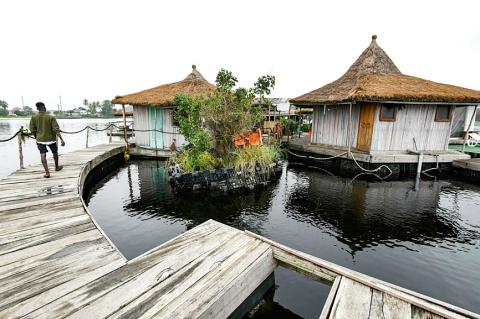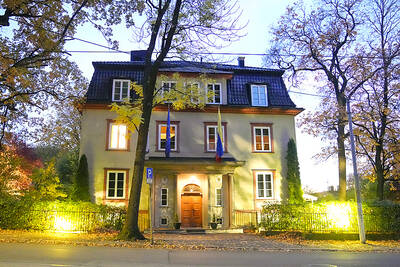The seaside resort offers visitors a cool drink or tasty meal, a dip in a pool, a karaoke session or an overnight stay, all with a view.
Nothing much new there, you might say — creature comforts such as this are pretty much standard in tropical hotels.
The big difference is that this mini resort is also a moveable island that floats on plastic bottles.

Photo: AFP
Riding on the Ebrie Lagoon in Abidjan, Ivory Coast’s economic hub, the unusual complex floats on a platform made from 700,000 discarded bottles and other buoyant debris.
Its inventor, Frenchman Eric Becker, said his creation is less harmful to seas and coastlines than traditional fixed, concrete resorts.
His “Ile Flottante” — French for “Floating Island” — comprises two thatched bungalows and a restaurant with a bar, two small pools, trees and shrubs, and a circular walkway, spread out over 1,000m2.
Visitors are brought to the moored island by a boat. Water is provided by a pipe from the shore. Electricity is supplied by solar panels, backed by a generator.
The island is bigger than a moored boat and handier than a jetty as it can also be taken to other locations, Becker said.
“It really is an artificial island that floats — you can move it,” he said.
Becker, a former computer entrepreneur, first toyed with the idea of building a catamaran, but it was when he came to Abidjan and saw the lagoon that the vision of a floating, moveable island came into his mind — and he sold everything he owned to achieve it.
The first step was to forage for everything floatable — “plastic bottles, bits of polystyrene, even beach sandals.” Bemused locals gave him the nickname of “Eric Bidon” — a word that has a subtle dual meaning of jerrycan and phoney.
“We bought disused bottles off people, we foraged for them in the lagoon. After a while, we learned to follow the wind and find the places where floating rubbish accumulates,” he said.
ECO BREAK
After living on his island for a number of years, Becker turned it into a hotel last year.
He has about 100 customers a week, mostly curious Ivorians or ecologically friendly tourists.
Others want a relaxing break from the bustling city and to use its swimming pools — taking a dip in the lagoon, fouled by industrial pollution and sewage outflows is an act for the foolhardy.
“When you’re competing with major hotels, you need an original idea like a floating island. It’s become a tourist attraction,” said Mathurin Yao Saky, a friend who has been advising Becker on the scheme.
Charles Moliere, a 28-year-old Frenchman who works in Ivory Coast for a large corporation, read about the resort in a guidebook.
“It’s very original, it’s a very untypical place — I’ve seen nothing like it elsewhere,” he said.
“I think it’s a neat idea to give a second life to plastic like this and to make a kind of small technical breakthrough. I like this place a lot.”
The island charges 15,000 CFA francs (US$25, 70) per person per day, which includes a meal and the ferry, and 60,000 CFA francs for a night.
Hamed Kone, a computer engineer, said he was visiting the complex after discovering it online.
“It’s the ecological qualities which impress me most — these days, people are talking more and more about the environment,” he said.
Becker “has transformed city rubbish into a pleasant place,” Kone said. “It’s an idea whose time has come. I hope it inspires other people.”
Becker says his 200 tonne island could be a prototype for all sorts of projects.
It is ideal for the sheltered waters of lagoons — shallow bodies of water separated from the ocean by narrow reefs or barrier islands.
“People could live [on floating islands] in lagoons that are pollution-free, and live from fish farming,” he said.
GREEN AND GREENER
Anything that involves human activity always carries an environmental cost, and Becker readily acknowledged that his idea was not totally green, but greener.
One concern is that the scheme also adds to the lagoon’s chronic pollution problem.
The city of Abidjan releases untreated effluent into the lagoon — the mini resort does the same right now, although Becker is testing technology intended to turn human waste into compost.
Even clearing the lagoon of all the floating plastic and debris is not enough, Becker said, adding: “What is nice about this concept is that we are taking something negative — plastic bottle pollution — and turning it into something positive. If only all of us could do this on an individual scale.”

STEPPING UP: Diminished US polar science presence mean opportunities for the UK and other countries, although China or Russia might also fill that gap, a researcher said The UK’s flagship polar research vessel is to head to Antarctica next week to help advance dozens of climate change-linked science projects, as Western nations spearhead studies there while the US withdraws. The RRS Sir David Attenborough, a state-of-the-art ship named after the renowned British naturalist, would aid research on everything from “hunting underwater tsunamis” to tracking glacier melt and whale populations. Operated by the British Antarctic Survey (BAS), the country’s polar research institute, the 15,000-tonne icebreaker — boasting a helipad, and various laboratories and gadgetry — is pivotal to the UK’s efforts to assess climate change’s impact there. “The saying goes

Police in China detained dozens of pastors of one of its largest underground churches over the weekend, a church spokesperson and relatives said, in the biggest crackdown on Christians since 2018. The detentions, which come amid renewed China-US tensions after Beijing dramatically expanded rare earth export controls last week, drew condemnation from US Secretary of State Marco Rubio, who on Sunday called for the immediate release of the pastors. Pastor Jin Mingri (金明日), founder of Zion Church, an unofficial “house church” not sanctioned by the Chinese government, was detained at his home in the southern city of Beihai on Friday evening, said

Floods on Sunday trapped people in vehicles and homes in Spain as torrential rain drenched the northeastern Catalonia region, a day after downpours unleashed travel chaos on the Mediterranean island of Ibiza. Local media shared videos of roaring torrents of brown water tearing through streets and submerging vehicles. National weather agency AEMET decreed the highest red alert in the province of Tarragona, warning of 180mm of rain in 12 hours in the Ebro River delta. Catalan fire service spokesman Oriol Corbella told reporters people had been caught by surprise, with people trapped “inside vehicles, in buildings, on ground floors.” Santa Barbara Mayor Josep Lluis

The Venezuelan government on Monday said that it would close its embassies in Norway and Australia, and open new ones in Burkina Faso and Zimbabwe in a restructuring of its foreign service, after weeks of growing tensions with the US. The closures are part of the “strategic reassignation of resources,” Venezueland President Nicolas Maduro’s government said in a statement, adding that consular services to Venezuelans in Norway and Australia would be provided by diplomatic missions, with details to be shared in the coming days. The Norwegian Ministry of Foreign Affairs said that it had received notice of the embassy closure, but no